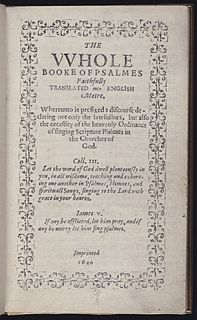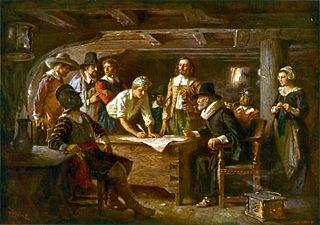
The Bay Psalm Book is a metrical Psalter first printed in 1640 in Cambridge, Massachusetts. It was the first book printed in British North America. The Psalms in it are metrical translations into English. The translations are not particularly polished, and not one has remained in use, although some of the tunes to which they were sung have survived. However, its production, just 20 years after the Pilgrims' arrival at Plymouth, Massachusetts, represents a considerable achievement. It went through several editions and remained in use for well over a century.

John Carver was one of the Pilgrims who braved the Mayflower voyage in 1620 which resulted in the creation of Plymouth Colony in America. He is credited with writing the Mayflower Compact and was its first signer, and he was also the first governor of Plymouth Colony.
A triolet is almost always a stanza poem of eight lines, though stanzas with as few as seven lines and as many as nine or more have appeared in its history. Its rhyme scheme is ABaAabAB and in 19th century English triolets often all lines are in iambic tetrameter, though in traditional French triolets from the 17th century on the second, sixth and eighth lines tend to be iambic trimeters followed by one amphibrachic foot each. In French terminology, a line ending in an iambic foot was denoted as masculine, while a line ending in an amphibrachic foot was called feminine. Depending on the language and era, other meters are seen, even in French. The first, fourth and seventh lines are identical, as are the second and final lines, thereby making the initial and final couplets identical as well. In a traditional French triolet, the second and third non-repeating lines rhyme with the repeating first, fourth, and seventh lines, while the non-repeating sixth line rhymes with the second and eighth repeating lines. However, especially in German triolets of the 18th and 19th centuries, one will see this pattern often violated.
Berhtwald was the ninth Archbishop of Canterbury in England. Documentary evidence names Berhtwald as abbot at Reculver before his election as archbishop. Berhtwald begins the first continuous series of native-born Archbishops of Canterbury, although there had been previous Anglo-Saxon archbishops, they had not succeeded each other until Berhtwald's reign.

James Chilton was a Leiden Separatist passenger on the historic 1620 voyage of the ship Mayflower and was the oldest person on board. Upon arrival in the New World, he was a signer of the Mayflower Compact. James Chilton was one of the earliest to die that winter, perishing within the following month.
Richard Rowlands, born Richard Verstegan, was an Anglo-Dutch antiquary, publisher, humorist and translator. Verstegan was born in East London the son of a cooper; his grandfather, Theodore Roland Verstegen, was a refugee from Guelders who arrived in England around the year 1500.

The booklet Mourt's Relation was written primarily by Edward Winslow, although William Bradford appears to have written most of the first section. It was written between November 1620 and November 1621 and describes in detail what happened from the landing of the Mayflower Pilgrims on Cape Cod in Provincetown Harbor through their exploring and eventual settling of Plymouth Colony. The book describes their relations with the surrounding Native Americans, up to what is commonly called the first Thanksgiving and the arrival of the ship Fortune in November 1621. Mourt's Relation was first published and sold by John Bellamy in London in 1622. This significant tract has often been erroneously cited as "by George Morton, sometimes called George Mourt".

Courante uyt Italien, Duytslandt, &c. was the first Dutch newspaper. It was published in June 1618 in Amsterdam. It was a regular weekly publication. It can be called the first broadsheet paper, because it was issued in folio-size. Before this, news periodicals had been pamphlets in quarto-size.
The Staple of News is an early Caroline era play, a satire by Ben Jonson. The play was first performed in late 1625 by the King's Men at the Blackfriars Theatre, and first published in 1631.
Nathaniel Butter was a London publisher of the early 17th century. The publisher of the first edition of Shakespeare's King Lear in 1608, he has also been regarded as one of the first publishers of a newspaper in English.
Nicholas Okes was an English printer in London of the Jacobean and Caroline eras, remembered for printing works of English Renaissance drama. He was responsible for early editions of works by many of the playwrights of the period, including William Shakespeare, Ben Jonson, John Webster, Thomas Middleton, Thomas Dekker, Thomas Heywood, James Shirley, and John Ford.
Events from the 1620s in England. This decade sees a change of monarch.
William Stansby (1572–1638) was a London printer and publisher of the Jacobean and Caroline eras, working under his own name from 1610. One of the most prolific printers of his time, Stansby is best remembered for publishing the landmark first folio collection of the works of Ben Jonson in 1616.

Mayflower was an English ship that transported the first English Puritans, known today as the Pilgrims, from England to the New World in 1620. After a grueling 10 weeks at sea, the Mayflower, with 102 passengers and a crew of about 30, reached America, dropping anchor near the tip of Cape Cod on November 11, 1620.

The Anglo-Saxon Chronicle is a collection of annals in Old English chronicling the history of the Anglo-Saxons. The original manuscript of the Chronicle was created late in the 9th century, probably in Wessex, during the reign of Alfred the Great. Multiple copies were made of that one original and then distributed to monasteries across England, where they were independently updated. In one case, the Chronicle was still being actively updated in 1154.
Also see: The ships Anne and Little James

The Mayflower Compact was an iconic document in the history of America, written and signed aboard the Mayflower on November 11, 1620 while anchored in Provincetown Harbor in Massachusetts. The Compact was originally drafted as an instrument to maintain unity and discipline in Plymouth Colony, but it has become one of the most historic documents in American history. It was published in London in Mourt's Relation in 1622, and the authors had added a preamble to clarify its meaning: "it was thought good there should be an association and agreement, that we should combine together in one body, and to submit to such government and governors as we should by common consent agree to make and choose."
The history of journalism in the United Kingdom includes the gathering and transmitting of news, spans the growth of technology and trade, marked by the advent of specialised techniques for gathering and disseminating information on a regular basis. In the analysis of historians, it involves the steady increase of the scope of news available to us and the speed with which it is transmitted.
Journalistic translation is the type of translation used notably in newspapers. It is it is a fairly new area of research in translation studies. The first research about it was conducted in the mid-2000s, but translations started appearing in newspapers as early as the 17th century.
Folke Dahl (1905–1970) was a Swedish librarian who had a large impact on the study of the early history of newspapers.






